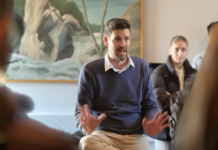This week, I’m going to switch gears a bit and have a look at education and talent, and to do that I’m going to return to the discussion on tech in Africa. You may recall from my <a href="https://archive.uwimprint.ca/article/4982-africas-tech-landscape">March 5 column</a> that Africa’s tech landscape has been rapidly expanding in recent years and that that growth is expected to continue — the continent is considered a sort of final frontier for investment. Despite this, it is typically not the first place employers think of looking for top tech talent. Andela, a talent accelerator based out of New York that operates in Lagos, Nigeria is attempting to change that.</p>
Andela was founded in 2014 by Waterloo grad and former Imprint director Iyinoluwa Aboyeji, online education mogul and entrepreneur Jeremy Johnson, youth education specialist and 15-year NGO veteran Christina Sass, and co-founder of two education technology companies Ian Carnevale. I talked to Aboyeji about Andela, the African and Nigerian tech landscape, and what he’s done since graduation.
As Aboyeji explained, the company was founded on a simple premise: “Brilliance is equally distributed, but opportunity is not.” In other words Andela’s macro-goal is to tap the deep well of undiscovered talent on the African continent and train the people they find to become world-class developers. To do this, Andela puts applicants through a rigorous application process that includes a general aptitude test, an interview, a home study test and finally a two to three week rigorous bootcamp. The few remaining (about 0.6 per cent of the initial applicants) are accepted to the program as fellows, when they begin a four-year intensive training program that aims to turn them into fully qualified, professional developers.
There are a few huge differences between the Andela’s model and traditional education. The biggest is that fellows are paid to attend. “It’s structured like a work experience,” Aboyeji explained. “We’re paying them throughout the entire process.” After they have sufficient programming experience (about 1,000 hours or four to six months after starting the program) they begin working for Andela’s clients: software firms from around the world. Unlike traditional outsourced developers, Andela fellows work directly with the employees at the firm they’re working at, giving them a much richer learning experience.
In case you’re wondering, Aboyeji admitted that this model was heavily inspired by UW’s co-op program and the success it has seen.
Additionally, Andela treats software development as a craft, meaning that their education process resembles what you would typically see in training for a trade. The program is heavily based on mentorship and techniques such as pair programming and is designed to produce professional grade programmers, not computer scientists.
At this point, you may be wondering how Andela makes money. Every partner that goes to Andela for employees pays the company for the services of their fellows. Andela takes a cut of that to pay for operations, their employee’s salaries and investments, and then passes the rest on to the fellows working for that partner. They ensure that wages meet middle-class income standards in the worker’s home country.
Andela’s model makes a lot of sense in a developing economy: it allows young people to learn an incredibly employable skill, gain real-world experience and support themselves (and their families) throughout the process, all without going into debt. “They’re amazed,” Aboyeji said when asked him what the response to the program from its fellows has been. “These are opportunities that are one of a kind here in Africa.”
The first fellows were accepted to Andela in May of last year and as the company nears the one-year mark, the outlook is very positive. Andela has tendered a total of 11,000 applications to date and the select few that have made it through the application process have made an excellent impression. Andela has seen a consistently growing client base, reports a 100 per cent retention rate and says that 75 per cent have come back for additional services.
Longer term, Aboyeji is very excited. “It is really transformational what can happen when we democratize the forces of production,” he said, referring to the power of computers and software to reduce imbalances by removing traditional economic, political and geographic boundaries. “I want Andela to be that force … [to make it] possible for good software to come out of Silicon Valley and good software to come out of Africa.”
More tangibly, Andela hopes to train 100,000 software developers over the next 10 years. As a first step towards the scale they will need, Aboyeji said they are investigating potential expansion options and are considering Nairobi, Ghana, South Africa, Rwanda and Zimbabwe, among others.
As a closing question, I asked Aboyeji what advice he would give to students who are interested in pursuing work opportunities in Africa:
“[Students] really need to think bigger about their impact. There are so many important inventions, so many big problems in the developing world that we can bring our knowledge of hardware and our mastery of software to together to solve … It’s ridiculous and interesting how much opportunity there is to build things that will impact the world starting from the developing world.”
He added that he’s excited to see what will happen when more Waterloo students turn their attention to Africa and work on problems that go beyond shaking up Silicon Valley to disrupt the developing world. He also mentioned that he would love to see some of them teaching Africans how to code.































